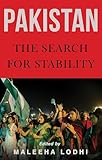Pakistan : the search for stability / Edited by Maleeha Lodhi
Publication details: London C. Hurst & Co. 2024Description: xxiv, 443 pages 22 cmISBN:- 9781911723776 (Paperback)
- :320.95491
| Item type | Current library | Shelving location | Call number | Materials specified | Status | Notes | Barcode | |
|---|---|---|---|---|---|---|---|---|
 BOOKs
BOOKs
|
National Law School | New Arrival - Display Area | 320.95491 LOD (Browse shelf(Opens below)) | PB | Not For Loan | Recommended by Mr. Kunal Ambasta | 40401 |
Contributors -
Abbreviations -
Introduction: Maleeha Lodhi -
1. The Relevance of History: Dushka H. Saiyid -
Part One: Politics:
2. Struggle for the Constitution: Salman Akram Raja -
3. Faultlines and Governance Failures: Maleeha Lodhi -
4. Parliamentary Politics Amid Turbulence: Ahmed Bilal Mehboob -
5. The Military’s Role in Hybrid Democracy: Uzair Younus -
Part Two: The Economy:
6. Rising from the Ashes: Salman Shah -
7. Debt and Bailouts: Khurram Husain -
8. Catch-23: Search for a New Development Paradigm: Murtaza Syed -
9. Enhancing Economic Competitiveness: Ishrat Husain -
Part Three: Society:
10. Pakistan’s Moment of Youth: Adil Najam -
11. Rescuing Education: Tariq Banuri -
12. Threat of Religious Extremism: Muhammad Amir Rana -
13. Women’s Rights: Dynamics of Agency: Khawar Mumtaz -
14. Environmental Crisis: Jamil Ahmad -
15. The Population Challenge: Zeba Sathar -
Part Four: Foreign Policy:
16. Pakistan-China: Permanent Friends: Riaz Mohammad Khan -
17. Pakistan-India: Still a Troubled Relationship: Aizaz Ahmad Chaudhry -
18. Pakistan-US Ties: Paradoxes Galore: Sadia Sulaiman -
19. The Taliban and Pakistan’s Afghan Dilemma: Zahid Hussain -
Concluding Note: Maleeha Lodhi -
Notes -
References -
Index.
Pakistan is facing a multitude of critical challenges, a 'Polycrisis' arising in many areas at once-- political, constitutional, economic, security- related, geo-political, demographic and ecological. These systemic predicaments are the cumulative consequence of decades of poor governance and squandered opportunities, whose convergence now creates a formidable existential threat. Maleeha Lodhi holds that Pakistan's governmental leaders, both civilian and military, have failed to take a long view and to outline a vision for the country. They have spent much of their time in power operating in crisis management or power preservation modes, postponing meaningful reform and looking for expedient short-term 'solutions'. The consequences of those sins of omission and commission are now coming together. In this new volume, Lodhi has brought together eighteen chapters by experts in a variety of fields, including Murtaza Syed, Zahid Hussain, Riaz Mohammad Khan and Adil Najam, to analyze Pakistan's various grand challenges and to suggest prognoses. This important compilation of rigorous, compelling essays will be essential reading for those who seek to understand what is at stake for Pakistan, both in terms of present-day crises and in terms of future trends.
There are no comments on this title.
